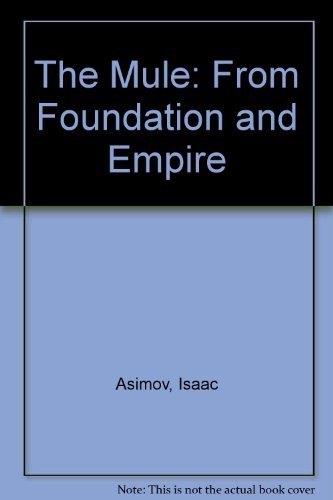Kevin B. O'Brien reviewed The Mule by Isaac Asimov
Review of 'The Mule' on 'Goodreads'
5 stars
This is the second volume of the Foundation series, and now Asimov gets to address an interesting problem, which is what happens if the Empire ever takes notice of the growing power of the Foundation and decides to "take it back". So he has a General Bel Riose travel out that way to investigate what is going on. Again, this is a direct life from history. For "Bel Riose", read "Belisarius", the Byzantine general who attempted to bring back the lands of the Western empire under the rule of the remaining empire in Constantinople. But the dynamics of imperial politics get in the way. Any general who is successful automatically becomes suspect of maybe wanting the imperial throne for themselves. This too is something observed in the end days of the Western Roman Empire, where some of Rome's best generals were executed by the Emperor because of suspicions. (And to …
This is the second volume of the Foundation series, and now Asimov gets to address an interesting problem, which is what happens if the Empire ever takes notice of the growing power of the Foundation and decides to "take it back". So he has a General Bel Riose travel out that way to investigate what is going on. Again, this is a direct life from history. For "Bel Riose", read "Belisarius", the Byzantine general who attempted to bring back the lands of the Western empire under the rule of the remaining empire in Constantinople. But the dynamics of imperial politics get in the way. Any general who is successful automatically becomes suspect of maybe wanting the imperial throne for themselves. This too is something observed in the end days of the Western Roman Empire, where some of Rome's best generals were executed by the Emperor because of suspicions. (And to be fair, successful generals very often did "aim for the purple"). So, while the Foundation was losing the battles to the superior forces of the Empire, in the end they prevailed, as psychohistory predicted. The 'dead hand of Hari Seldon" decided the outcome.
But now Asimov had a problem. If the Foundation absolutely could not lose because of Seldon's psychohistory, you have no more stories. Stories require conflict, and how can you have conflict when the outcome is pre-ordained? Asimov solves this brilliantly with the introduction of a mutant, called The Mule, who could never be predicted by psychohistory. And The Mule has some kind of psychic powers what let him take over everything, including the Foundation, virtually without firing a shot. So now there is real conflict. Can Seldon's plan be salvaged in any way? Well, there were obscure references by Seldon to a Second Foundation, located at the other end of the galaxy, where "Stars End". So a search is mounted. Fortunately, The Mule is prevented from finding this Second Foundation.
I now have this as part of a 7-book set of all of Asimov's Foundation novels in e-book form.



